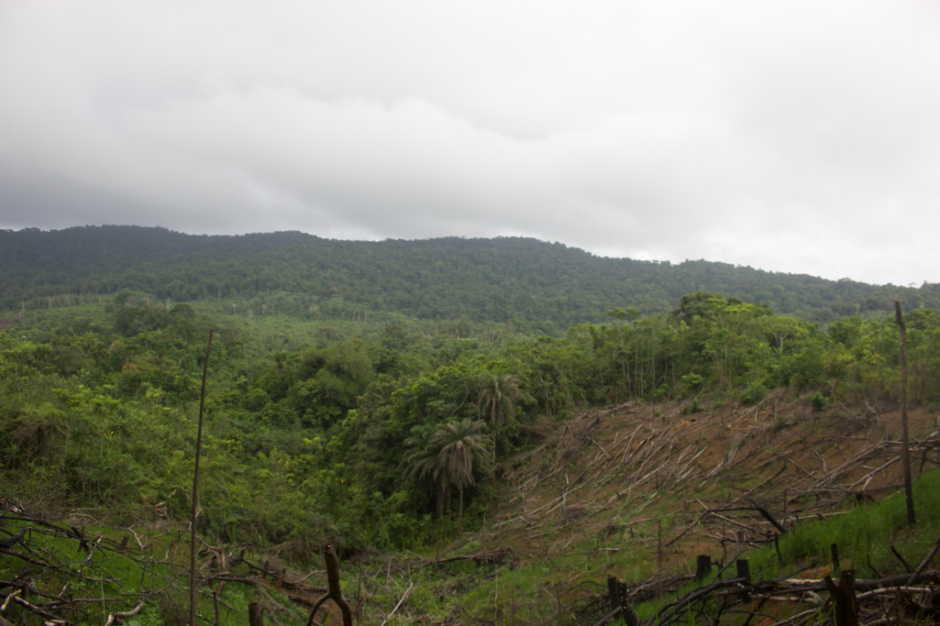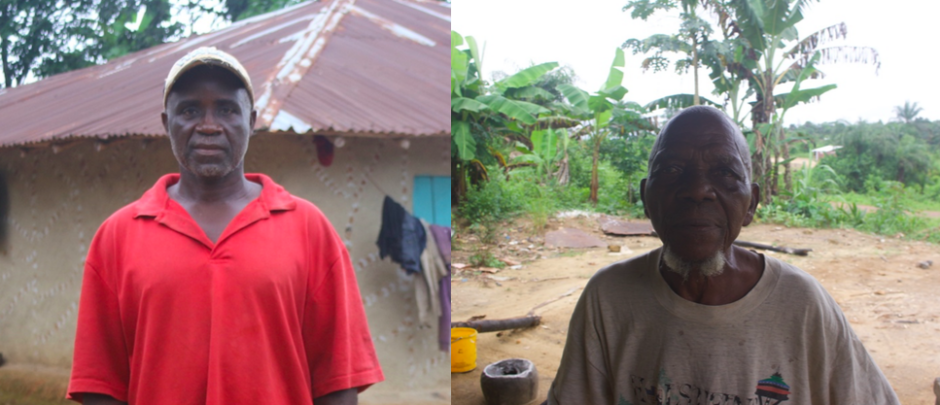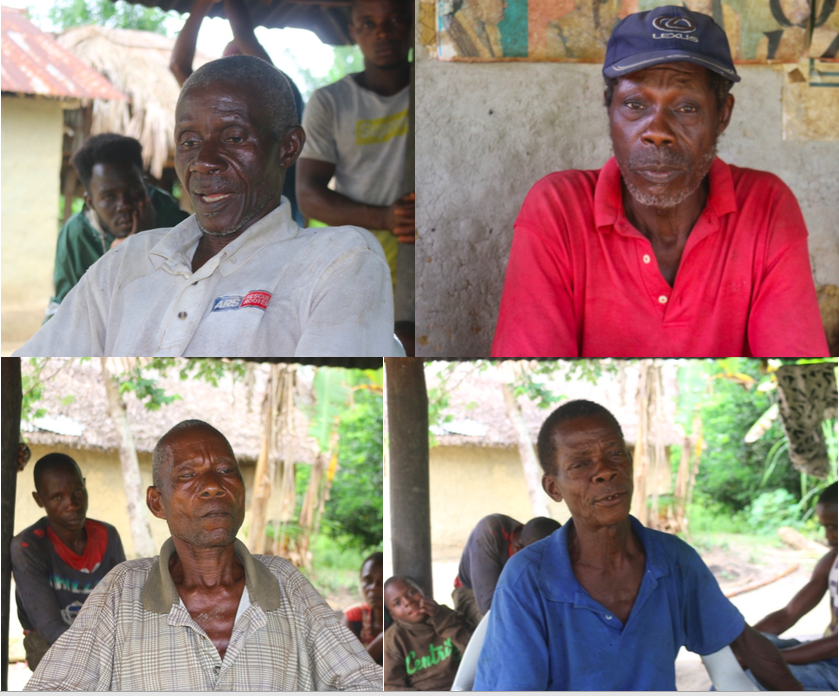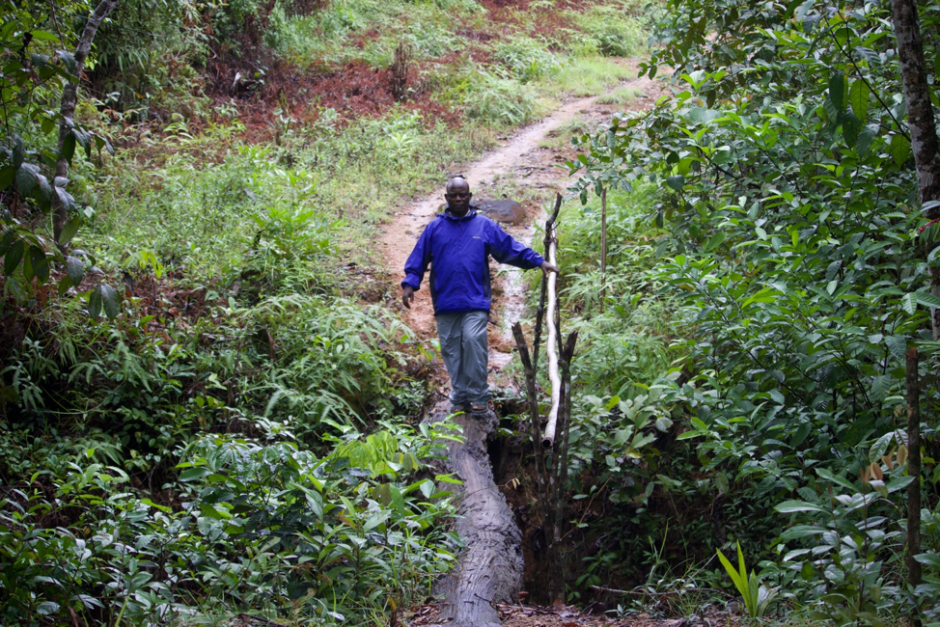
Editor’s Note: This story is the first of a two-part series on an illegal logging agreement between Vambo and Marloi townships in Grand Bassa County, and African Trades Entrepreneur Enterprises Incorporated.
VAMBO – Officials of Grand Bassa County have signed an illegal deal with a company to pave a dusty road through two townships in the county in exchange for logs. Forestry authorities have denounced the agreement, which is not backed by law and is reminiscent of logging practices that left communities more impoverished and helped fuel the Liberian Civil War.
The company, African Trades Entrepreneur Enterprise Incorporated, will construct some 75 kilometers of road through Vambo and Marloi and extract timber from road edges 1.5 kilometers deep either side into the forest according to the memorandum of understanding agreement between the two parties seen by FrontPage Africa. It was signed by Representative Mary Karwor of Grand Bassa electoral district No. 2, Superintendent Janjay Baikpeh, Commissioner of Vambo Daniel Dayougar, Commissioner of Marloi Amos Joe, the Superintendent of Statutory District No.2 Nancy Greene and other local officials of the two would-be-affected communities.
“The total maximum contract price shall be the extraction of marketable species from the community road alignment of 1.5 kilometer left and 1.5 kilometer right in execution of the rehabilitation and construction of the…road to the contractor either for us or sale or whatsoever means that the contracting company deems necessary,” the memorandum of understanding states. “It is further mutually agreed that payment shall be made in forest product.” The deal has not been signed by Radovan Jovanovic and Ljubo Zivkovic, the two Serbian officials of the African Trades Entrepreneur Enterprise, but it is dated to come into effect on May 13, 2020 and end December 10, 2022.
Amos Togar Sweegaye, the CEO of the company, confirmed the deal had been agreed to and praised the officials for signing the document in an interview with FrontPage Africa in Buchanan. “The Superintendent is very, very progressive. The honorable Representative for that district, they all are very cooperative,” Sweegaye said. “They signed this document with great anticipation. They want to see more than that. They have been very cooperative.
But the MoU is illegal in a number of ways. The company did not renew its business registration since it expired in July last year, before the deal was struck. It is not clear whether it is a Liberian or Serbian company. It is a Liberian firm, according to its expired business registration. However, the MoU indicates it is Serbian. The FDA played no role in the agreement as is required by the Community Rights Law (CRL) of 2009 with Respect to Forest Lands.
“We have absolutely no idea of any contract or MoU between the community and a company,” said Atty. Gertrude Nyaley, the technical manager of the community forest department of the Forestry Development Authority (FDA), the government agency that oversees the sector.
“This is an interesting development and speaks volumes to the continuous meddling in community forest activities by county authorities. This situation has plagued community forest activities across the country and complicates the work of the FDA.” Nyaley said the FDA would investigate the matter.
Communities can sign logging contracts under the CRL but not until they reach a forest management agreement with the FDA. Vambo and Marloi are at the boundary-harmonization stage of a nine-step, legal process for community forest status, according to Nyaley. The township duo still needs to form a body that will govern the forest before they have the right to sign any forestry contract.
The MoU is unpopular in Vambo, where the largest stretch of the 8.5-foot-wide road would lie. Residents have confronted Dayougar, who has called for a “reconciliation meeting” on the on the controversial MoU. He admitted in a mobile phone interview with FrontPage Africa last Saturday—more than two weeks since our initial interview with him in the township—that the deal is illegal.
“We are going to challenge that memorandum of understanding,” said Ernest Gblorso, the chairman of the Vambo Development Association. “Our resources are the only thing we depend on here. We cannot allow that to happen because [the] Superintendent and [the] Representative have signed.”
Superintendent Baikpeh did not respond to emailed queries, follow-up messages and mobile phone calls for comment on the deal.
Representative Karwor was absent on three occasions when our reporter contacted her office at the Capitol Building in Monrovia. Her phone did not ring on several attempts to contact her.
The Deal echoes ‘Conflict Timber’
Roads built in exchange for logs is an old practice that was abolished in the early 2000s with the Liberian forestry reform. It helped fuel the 14-year civil conflict in Liberia. Companies sold logs they extracted from communities and used their proceeds to fund warring factions. The United Nations imposed sanctions on Liberia’s timbers in 2003 in an effort to stop the practice. A transparent process was put in place using barcodes to track logs from the time of harvest to export. The codes are monitored by Société Générale de Surveillance (SGS), an independent Swiss firm. It was an integral part of the country’s forestry reform that led to the UN lifting of the sanctions in 2006.
Vambo has its own experience with what environmental campaigners called at the time, “logs of war,” “blood timber” or conflict timber.” In 1990s, RETCO Liberia Timber Industry and North Eastern Logging Company (NELCO)/SIBC—two companies that were active during the time of conflict timber—logged in the area. When the latter was pulling out, chiefs and elders protested by seizing some of the company’s equipment. The company had to pay L$10,000 (nearly LD16,000 today) to quell the standoff, townspeople told FrontPage Africa.

Key chiefs and elders of the townships also said they did not know of the agreement nor have seen it despite hearing about it for months. Many people here first learned about the agreement after survey works on the road reached their villages, said Joe Nunugar of Baryogar town and speaker of Vambo’s traditional council.
“We did not go for any meeting,” remarked Jacob Cee of Gbeewillie town, the head traditional leader of Vambo.
Signatories of the document were handpicked by officials, the elders told this reporter. Three people who signed the MoU are Dayougar’s relatives—Obediah Dayougar (youth president), his brother; Sarah Payegar (women leader), sister; and Peter Payegar (Unification town master) brother-in-law.

Mamie Tutu, a woman from Marloi, claimed she was “deceived” into signing the MoU. “[Dayougar] told me that it was not [an] MoU. He said it was just for the road,” Tutu said.
Responding to the allegations prior to conceding the deal was illegal, Commissioner Dayougar had said Gblorso and the elders of Vambo were not present to sign the document, so he selected those available, including his relatives. But he conceded that he was aware the MoU was inadequate, blaming coronavirus-related crowd restrictions imposed by the government.
The document is required to be made publicly available before being signed but that has not happened. There have been no copies made for circulation, Sweegaye, the company’s CEO, revealed. The document is on legal paper and could only be photocopied in Monrovia, he added.
Despite not seeing the document, chiefs and elders who signed it said they did it to bring relief to a community that has suffered for decades.
The bad road network is a major problem in Vambo – one thing everybody agrees. Successive governments have not done anything to solve the problem. Although the township is around 47 kilometers from Monrovia, it is one of the most underdeveloped places in Liberia. The main route leading into the community—a forest-blanketed footpath through steep, rocky hills, shallow valleys, and rotten log bridges—is impassable by vehicles. Even motorcyclists, famed for their ability to ply the worst roads in the remotest places, hardly venture here. It is a five-hour walk to the market, school and hospital on the Buchanan highway. Market women drown each year transporting goods on their heads, townspeople said.

“We need road because there is no road here for us to carry our market on the road,” said Joseph Gblorso, an elder of Gblorso town and a relative of Ernest Gblorso.
“For the [government officials] to be working and making the money, let us lick hands, too,” said Johnny Tutu, the eponym of Tutu town, the biggest town in Marloi— the father Mamie Tutu. “If we don’t join them, we will not eat anything.”
But resistance to the deal is growing. Commissioner Dayougar has scheduled a meeting with the community for Wednesday to revisit the MoU.
This story was a collaboration with New Narratives as part of our Land Rights and Climate Change Reporting Project. Funding was provided by the American Jewish World Service.
